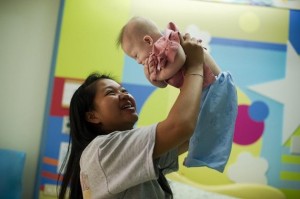
Thai surrogate mother Pattaramon Chanbua with her baby Gammy, born with Down Syndrome, at the Samitivej hospital in Sriracha district, in Thailand’s Chonburi province on August 4, 2014. AFP
The Thai surrogate mother of a baby born with Down Syndrome vowed Monday to “never abandon” him after the Australian parents reportedly refused to care for the child, sparking a moral debate and a cascade of donations for the boy’s medical care.
Pattaramon Chanbua and seven-month old Gammy have been at the centre of a surrogacy controversy after reports emerged that the Australian couple flew to Thailand and took the boy’s healthy twin sister at birth, but rejected the disabled child.
The 21-year-old surrogate said she would raise Gammy, who has been in hospital with a lung infection and heart condition for the last few days a couple of hours drive southeast of Bangkok.
“I am glad that in this unlucky situation there is a blessing that we are together,” Pattaramon told AFP at Gammy’s bedside in Chonburi province.
“I never thought of having an abortion, I never thought to abandon him. I love him as my own baby… he is my baby. I love him very much,” she said.
“Gammy is getting better step-by-step,” she said, adding the $215,000 donated so far by well-wishers across the globe would go towards his treatment and school fees.
“From all of these unlucky things I am glad that we are together. I love him very much, I will never abandon him,” she said.
The case has also sparked fevered debate on the moral and legal grounding of international surrogacy, with Australians who travel overseas to side-step domestic restrictions falling under the spotlight.
Australia’s immigration minister on Monday labelled Pattaramon a “saint” and “absolute hero” for taking on the disabled baby despite already having two young children of her own.
“It is terrible, just absolutely horrible and heartbreaking,” Scott Morrison said of the case.
“But I have got to tell you who is an absolute hero in all of this and that is the Thai mother. She is a saint,” he said.
“Sure there are lots of Australians who are desperate to be parents, but that can never I think sanction what we have just seen here.”
— ‘Would be arrested for abortion’ —
The full picture of how Gammy came to be left with Pattaramon has not emerged with the Australian parents yet to come forward with their version of events.
But Pattaramon says she agreed to carry another Thai donor’s egg fertilised by the Australian man in exchange for around $14,900.
An agency, which she refuses to name for legal reasons, acted as the go-between with the Australians.
She says the agency told her the parents wanted her to have an abortion once medical tests revealed the boy had Down Syndrome but she refused.
Abortion is illegal in Thailand — except in very specific cases including rape and to protect the mother’s health — and it also runs counter to beliefs in the overwhelmingly Buddhist kingdom.
“The agent said the couple would pay for an abortion… but we are in a Buddhist country, they don’t understand — if I had an abortion I would be arrested as it is like killing a person,” she said, adding the fallout since Gammy’s birth has battered her trust in both the agency and the Australian couple.
Commercial surrogacy, in which a woman is paid to carry a child, is not permitted in Australia but couples are able to use an altruistic surrogate who receives no payment beyond medical and other reasonable expenses.
To avoid those curbs, Surrogacy Australia said couples are increasingly choosing to find women willing to carry their baby overseas, with several hundred each year travelling to India, Thailand and the United States.
Thailand health authorities say it is also illegal to pay for surrogacy in the kingdom and someone who agrees to carry a baby must be related to the intended parents.
While the case added fuel to the highly-emotive debate on surrogacy in Australia and beyond, it has also stirred an outpouring of sympathy for Gammy and Pattaramon.
The “Hope for Gammy” fundraising page has already topped its $200,000 target from thousands of donors.
One donor said they gave $50 because they also have a son with Down Syndrome.
“I cried many tears as read about Grammy,” they added in a post on the site
RELATED STORIES:
Via surrogacy, some US men become single dads
US mom charged with death of Down syndrome son